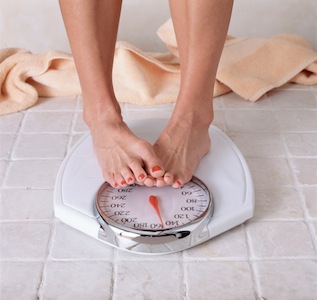This originally appeared on The Frisky. Republished here with permission.
The June issue of Allure has the usual headlines about what beauty products to buy and how to get good hair and better skin. Also thrown into the sexy, sun-kissed mix is this tidbit of information about their cover girl: “Zoe Saldana: 115 Pounds Of Grit And Heartache.” Hey, she’s slight but this gal’s got might!
Do the editors of a beauty magazine think of a celebrity’s weight as just some random fun fact to share with their readers? No, of course they don’t. It’s aspirational. Even if the number itself is completely out of the realm of healthy possibility for most women, it reinforces a longing—that dream of ultimate thinness. It’s defining. An entire interview with Saldana and how do they describe the stand out qualities they learned about her for their cover? In pounds.
But what is most insidious about that headline is that it immediately forces comparison. For many women, that comparison is likely to stoke insecurity. Even if it doesn’t, it’s still a giant waste of time and energy: Do you weigh less or more? But wait, are you big-boned or small-boned? You might weigh this much, but actually you wear this size in pants or that size in tops. You felt best about yourself when you were this weight. You’re proud of your weight and fuck anyone who says you shouldn’t be!
These are the conversations that run through women’s heads when weight is the topic. We even have them with each other. I’ve seen that exact chain of questions, comparisons and reassurances play out in comments sections of my own articles, despite the fact that I make a point to say that I do not weigh myself. I have no idea what I weigh. I subscribe to the radical notion that we’d all be better off if scales were these contraptions we stepped on in the doctor’s office and weight did not become a source—sometimes a daily and often a fluctuating source—of shame, frustration, or pride.
But what if you just want to be healthy? What about obesity? That’s a thing! Isn’t it good to want to be a “healthy” weight? I’m going to say NO. Stay with me here for a sec. The choices you make about what you eat, how much you exercise, how proactive you are about attending to your physical and emotional well-being—those are the choices that impact your health. The number on the scale might change as you make healthier or less healthy choices. But you know what? It might not. A woman who binge eats will be healthier if she starts seeing a good therapist who can help her curb the disordered eating behavior and address the underlying issues that fuel it. Whether or not that results in weight loss isn’t the point. If I suddenly start eating more crap takeout food and start taking cabs everywhere, I will definitely have less cash. I will probably have less energy. It might affect my blood pressure and my cholesterol. Will I gain weight? Maybe. Again, not the point. I gained and lost weight through years of disordered eating (and believe me, I tracked the number by the minute in those days). I was in a “healthy” weight range when I was a raging bulimic. Bingeing and purging? It ain’t healthy. The reality is that weight is not a reliable or holistic indicator of a person’s health.
I work in the eating disorders field, where we avoid talking about numbers like weight and size because they can be triggering. If you’re struggling to make peace with your body, the comparison game keeps you engaged in the battle. I would argue that this trigger exists to some degree for the majority of women. In a perfect world, weight would just be one neutral stat among many others. That is not the world we live in. We live in a world—or at least a corner of the world—where weight is an obsession. Full-blown, diagnosable eating disorders affect millions. The gray, under-the-diagnostic-radar area of disordered eating is a way of life for three-quarters of women. Behaviors like chronic dieting, secretive eating, using diet pills, and skipping meals are so commonplace that they’ve become the twisted norm in our culture.
So. Most of us have or have had fucked-up relationships with food, weight, and our bodies. Do you tell yourself that you’re better or worse, more or less attractive based on what the scale tells you? Do you find yourself craving validation that your height/weight ratio is “OK” when you hear or read about another person’s weight? Those are the kinds of questions that can weigh on us when we focus on weight. Here’s a plan to help quiet them:
Eat mostly nutritious foods that you enjoy.
Eat some foods just because they taste good.
Wear whatever the hell you want to wear.
Get some exercise.
Get some sleep.
Read.
Listen to music.
Talk to people you respect and who respect you.
Consume and/or create art.
Make an effort to work on your “issues,” whatever they may be.
Make yourself useful.
Have fun.
Laugh.
Put away the scale.
Claire Mysko is the author of You’re Amazing! A No-Pressure Guide to Being Your Best Self and Does This Pregnancy Make Me Look Fat? The Essential Guide to Loving Your Body Before and After Baby. She oversees content for Proud2Bme, a program of the National Eating Disorders Association. Follow her on Twitter.
Related Links:

